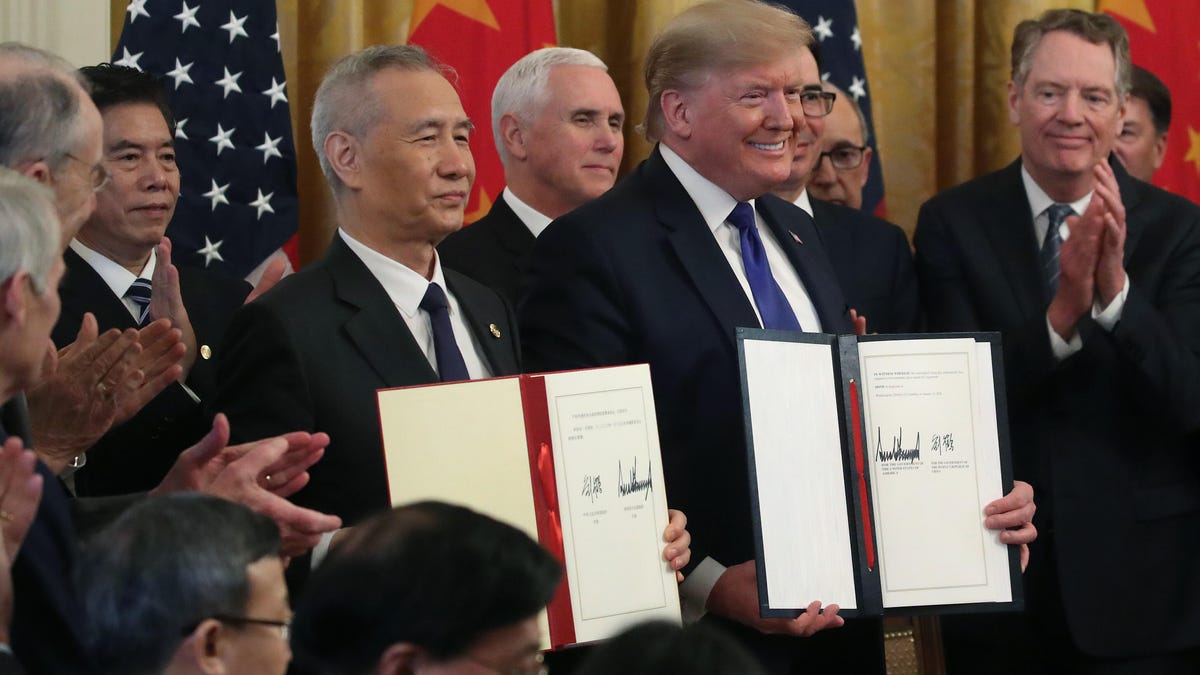Trump's Phase 1 trade deal with China hasn't solved all of tech's issues
China has agreed to stronger intellectual property protections. But tariffs on more than $300 billion worth of goods still remain, as do other unresolved trade issues.

President Donald Trump and Chinese Vice Premier Liu He, hold up signed agreements of Phase 1 of a trade deal between the US and China, in the East Room at the White House, on Jan. 15, 2020 in Washington, DC.
President Donald Trump on Wednesday signed a "Phase One" trade deal with China, which addresses some key issues for the tech industry , including new protections for American intellectual property. But the bulk of the tariffs imposed earlier this year still remain as do bigger structural issues around China's trade practices.
The eight-part agreement was signed after more than a year of intense negotiations and billions of dollars spent on tariffs. President Trump called it "a momentous step" toward a "fair and reciprocal trade" deal.
But the deal falls short of the comprehensive trade reform the Trump administration had sought when it launched its trade war with China nearly two years ago. It also leaves tariffs on hundreds of billions of products imported from China as well as many other thornier issues unresolved.
" Phase One is a big step toward normalizing our trading relationship with China and ending this costly trade war," said Gary Shapiro, head of the Consumer Technology Association. "But market uncertainty remains until we see permanent tariff removal -- or return the billions of dollars our nation has paid because of these tariffs."
Intellectual property protections
The big win for the tech industry achieved through the deal includes stronger Chinese legal protections for American intellectual property. Specifically, China has agreed to stop forcing American companies to transfer technology as a condition of doing business in China. This has been a common way for China to get its hands on US intellectual property, which it has used to develop its own competing products and industries.
China also agreed to improve criminal and civil procedures for combatting online patent and copyright infringement. And it has agreed to crack down on the sale of counterfeit goods, another issue that's plagued the consumer electronic and tech industry among other types of businesses.
Organizations representing companies in the tech sector said they welcomed the Phase 1 agreement. But they agreed that some key issues are still unresolved.
"Additional work on structural issues is critical to achieve a Phase 2 agreement," Carl Schonander from the Software & Information Industry Association (SIIA), which represents the software and digital content industries, said in a statement. "Besides effective rules on intellectual property and forced technology transfer, it is important to achieve reciprocal market access, cross-border data flows, and withdrawal of market-distorting subsidies."
Indeed, issues relating to China's telecom equipment maker Huawei and the security of its 5G gear were not addressed as part of the Phase 1 deal. National security officials in the US have long-warned that equipment from Huawei and other Chinese manufacturers could be used to spy on other countries and companies. In May, President Donald Trump issued an executive order effectively banning new Huawei gear from US communications networks.
The Federal Communications Commission also voted last year to cut off funding to wireless carriers that use equipment from these firms, because of the national security risk associated with the gear.
Huawei, which has denied its equipment can be used to spy or to compromise US security, is seen as a large threat given the fact that the company is one of the largest suppliers of equipment to build the next generation of wireless networks called 5G. The US and others have also accused the Chinese government of subsidizing Huawei and other companies, which has allowed them to offer carriers throughout the world low-cost loans on equipment and service contracts.
On Tuesday, a group of US Senators proposed legislation to provide more than $1 billion in federal subsidies to companies competing with Huawei on 5G telecom equipment and to encourage US participation in setting standards for the next generation of wireless technology.
Tariffs
Over the past 18 months, Trump has used tariffs -- which are taxes that importers in the US must pay to customs when imported goods arrive from China -- as a tool to put pressure on the Chinese government to make changes. But the two sides have been upping the ante on each other over several months. The result has been an all-out trade war that's been affecting tech-sector products.
The Phase 1 deal also included the rollback of some of the tariffs imposed earlier this year, which CTA says have cost the consumer tech industry $17.5 billion, including $1.7 billion in taxes for products critical to 5G deployment.
As part of Wednesday's deal, the US agreed to cut the tariff rate it imposed on Sept 1. on $120 billion in Chinese goods, which included smart speakers, wireless headsets and earbuds, TVs and smart watches to 7.5%. The deal also indefinitely postponed tariffs on products, such as laptops and tablets , video game consoles and smartphones that were scheduled to go into effect on Dec. 15.
This is good news for the tech industry. But the 25% tariff placed on $250 billion worth of Chinese goods, such as desktop PCs , chargers, power adapters and connected thermostats that went into effect earlier in the year will remain unchanged for now.
These tariffs are likely to be part of negotiations in Phase 2 of the deal, US Treasury Secretary Steven Mnuchin said on Wednesday. Those talks aren't expected to result in a deal until after the US presidential election in November.
"Tariffs are taxes on Americans -- not the Chinese," Shapiro said. "The postponement of tariffs is a temporary reprieve on many of Americans' favorite tech products."

